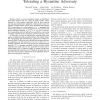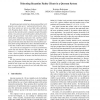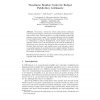264 search results - page 30 / 53 » Bounding the number of tolerable faults in majority-based sy... |
104
Voted
OPODIS
2008
15 years 3 months ago
2008
Probabilistic quorum systems can tolerate a larger fraction of faults than can traditional (strict) quorum systems, while guaranteeing consistency with an arbitrarily high probabi...
122
click to vote
DC
2007
2007
Booting clock synchronization in partially synchronous systems with hybrid process and link failures
15 years 1 months ago
This paper provides description and analysis of a new clock synchronization algorithm for synchronous and partially synchronous systems with unknown upper and lower bounds on delay...
111
Voted
ICDCS
2010
IEEE
15 years 5 months ago
2010
IEEE
—There are several analytical results on distributed hash tables (DHTs) that can tolerate Byzantine faults. Unfortunately, in such systems, operations such as data retrieval and ...
105
click to vote
ICDCS
2006
IEEE
15 years 8 months ago
2006
IEEE
Byzantine quorum systems have been proposed that work properly even when up to f replicas fail arbitrarily. However, these systems are not so successful when confronted with Byzan...
FDTC
2006
Springer
15 years 5 months ago
2006
Springer
We present a scheme for robust multi-precision arithmetic over the positive integers, protected by a novel family of non-linear arithmetic residue codes. These codes have a very hi...



